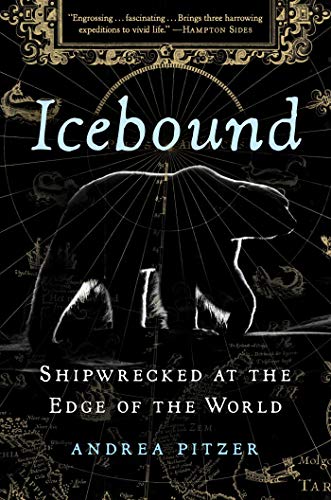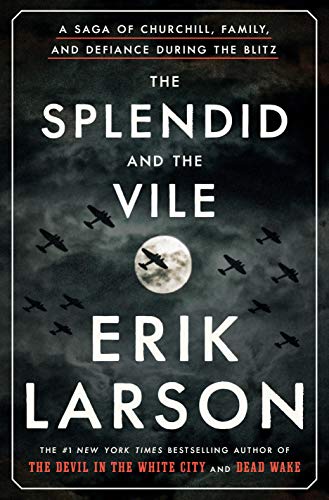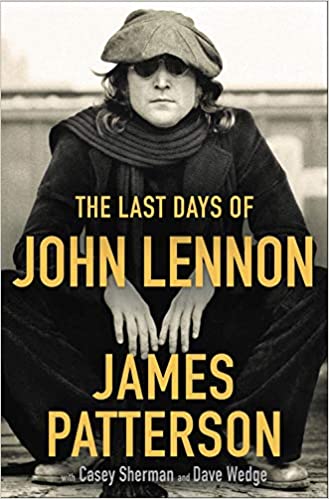
ICEDBOUND
by Andrea Pitzer
In the bestselling tradition of Hampton Sides’s In the Kingdom of Ice, a riveting and cinematic tale of Dutch polar explorer William Barents and his three harrowing Arctic expeditions—the last of which resulted in a relentlessly challenging year-long fight for survival.
The human story has always been one of perseverance—often against remarkable odds. The most astonishing survival tale of all might be that of 16th-century Dutch explorer William Barents and his crew of sixteen, who ventured farther north than any Europeans before and, on their third polar exploration, lost their ship off the frozen coast of Nova Zembla to unforgiving ice. The men would spend the next year fighting off ravenous polar bears, gnawing hunger, and endless winter.
In Icebound, Andrea Pitzer masterfully combines a gripping tale of survival with a sweeping history of the great Age of Exploration—a time of hope, adventure, and seemingly unlimited geographic frontiers. At the story’s center is William Barents, one of the 16th century’s greatest navigators whose larger-than-life ambitions and obsessive quest to chart a path through the deepest, most remote regions of the Arctic ended in both tragedy and glory. Journalist Pitzer did extensive research, learning how to use four-hundred-year-old navigation equipment, setting out on three Arctic expeditions to retrace Barents’s steps, and visiting replicas of Barents’s ship and cabin.
“A visceral, thrilling account full of tantalizing surprises” (Andrea Barrett, author of The Voyage of the Narwhal ), Pitzer’s reenactment of Barents’s ill-fated journey shows us how the human body can function at twenty degrees below, the history of mutiny, the art of celestial navigation, and the intricacies of building shelters. But above all, it gives us a first-hand glimpse into the true nature of human courage.

KILL SWITCH
by Adam Jentleson
“An impeccably timed book. . . . Jentleson understands the inner workings of the institution, down to the most granular details, showing precisely how arcane procedural rules can be leveraged to dramatic effect.” ? Jennifer Szalai, New York Times
An insider’s account of how politicians representing a radical white minority of Americans have used “the world’s greatest deliberative body” to hijack our democracy.
Every major decision governing our diverse, majority-female, and increasingly liberal country bears the stamp of the United States Senate, an institution controlled by people who are almost exclusively white, overwhelmingly male, and disproportionately conservative. Although they do not represent a majority of Americans―and will not for the foreseeable future―today’s Republican senators possess the power to block most legislation. Once known as “the world’s greatest deliberative body,” the Senate has become one of the greatest threats to our democracy. How did this happen?
In Kill Switch, Senate insider Adam Jentleson contends that far from reflecting the Framers’ vision, the Senate has been transformed over the decades by a tenacious minority of white conservatives. From John Calhoun in the mid-1800s to Mitch McConnell in the 2010s, their primary weapon has been the filibuster, or the requirement that most legislation secure the support of a supermajority of senators. Yet, as Jentleson reveals, the filibuster was not a feature of the original Senate and, in allowing a determined minority to gridlock the federal government, runs utterly counter to the Framers’ intent.
For much of its history, the filibuster was used primarily to prevent civil rights legislation from becoming law. But more recently, Republicans have refined it into a tool for imposing their will on all issues, wielding it to thwart an increasingly progressive American majority represented by Barack Obama’s agenda and appointees. Under Donald Trump, McConnell merged the filibuster with rigid leadership structures initially forged by Lyndon Johnson, in the process surrendering the Senate’s independence and centrality, as infamously shown by its acquiescence in Trump’s impeachment trial. The result is a failed institution and a crippled democracy.
Taking us into the Capitol Hill backrooms where the institution’s decline is most evident, Jentleson shows that many of the greatest challenges of our era―partisan polarization, dark money, a media culture built on manufactured outrage―converge within the Senate. Even as he charts the larger forces that have shaped the institution where he served, Jentleson offers incisive portraits of the powerful senators who laid the foundation for the modern Senate, from Calhoun to McConnell to LBJ’s mentor, Richard Russell, to the unapologetic racist Jesse Helms.
An essential, revelatory investigation, Kill Switch ultimately makes clear that unless we immediately and drastically reform the Senate’s rules and practices―starting with reforming the filibuster―we face the prospect of permanent minority rule in America.

SAVING JUSTICE
by James Comey
James Comey, former FBI Director and New York Times bestselling author of A Higher Loyalty, uses his long career in federal law enforcement to explore issues of justice and fairness in the US justice system.
James Comey might best be known as the FBI director that Donald Trump fired in 2017, but he’s had a long, varied career in the law and justice system. He knows better than most just what a force for good the US justice system can be, and how far afield it has strayed during the Trump Presidency.
In his much-anticipated follow-up to A Higher Loyalty, Comey uses anecdotes and lessons from his career to show how the federal justice system works. From prosecuting mobsters as an Assistant US Attorney in the Southern District of New York in the 1980s to grappling with the legalities of anti-terrorism work as the Deputy Attorney General in the early 2000s to, of course, his tumultuous stint as FBI director beginning in 2013, Comey shows just how essential it is to pursue the primacy of truth for federal law enforcement.
Saving Justice is gracefully written and honestly told, a clarion call for a return to fairness and equity in the law.

BRAVEY
by Alexi Pappas
The Olympic runner, actress, filmmaker and writer Alexi Pappas shares what she’s learned about confidence, self-reliance, mental health, embracing pain, and achieving your dreams.
“Heartbreaking and hilarious.”—Mindy Kaling • “A beautiful read.”—Ruth Reichl • “Essential guidance to anyone dreaming big dreams.”—Shalane Flanagan • “I couldn’t put it down.”—Adam Grant
run like a bravey
sleep like a baby
dream like a crazy
replace can’t with maybe
When “Renaissance runner” (New York Times) Alexi Pappas—Olympic athlete, actress, filmmaker, and writer—was four years old, her mother died by suicide, drastically altering the course of Pappas’s life and setting her on a search for female role models. When her father signed his bereaved daughter up for sports teams as a way to keep her busy, female athletes became the first women Pappas looked up to, and her Olympic dream was born. At the same time, Pappas had big creative dreams, too: She wanted to make movies, write, and act. Despite setbacks and hardships, Pappas refused to pick just one lane. She put in a tremendous amount of hard work and wouldn’t let anything stand in her way until she achieved all of her dreams, however unrelated they may seem to outsiders. In a single year, 2016, she made her Olympic debut as a distance runner and wrote, directed, and starred in her first feature film.
But great highs are often accompanied by deep lows; with joy comes sorrow. In Bravey, Pappas fearlessly and honestly shares her battle with post-Olympic depression and describes how she emerged on the other side as a thriving and self-actualized woman. Unflinching, exuberant, and always entertaining, Bravey showcases Pappas’s signature, charming voice as she reflects upon the touchstone moments in her life and the lessons that have powered her career as both an athlete and an artist—foremost among them, how to be brave.
Pappas’s experiences reveal how we can all overcome hardship, befriend pain, celebrate victory, relish the loyalty found in teammates, and claim joy. In short: how every one of us can become a bravey.

THREE WISE MEN
by Beau Wise and Tom Sileo
From Beau Wise and Tom Sileo comes Three Wise Men, an incredible memoir of family, service and sacrifice by a Marine who lost both his brothers in combat–becoming the only “Sole Survivor” during the war in Afghanistan.
Shortly after the 9/11 attacks, three brothers by blood became brothers in arms when each volunteered to defend their country. No military family has sacrificed more during the ensuing war, which has become the longest ever fought by America’s armed forces.
While serving in Afghanistan, US Navy SEAL veteran and CIA contractor Jeremy Wise was killed in an al Qaeda suicide bombing that devastated the US intelligence community. Less than three years later, US Army Green Beret sniper Ben Wise was fatally wounded after volunteering for a dangerous assignment during a firefight with the Taliban. Ben was posthumously awarded the Silver Star, while Jeremy received the Intelligence Star―one of the rarest awards bestowed by the U.S. government―and also a star on the CIA’s Memorial Wall.
United States Marine Corps combat veteran Beau Wise is the only known American service member to be pulled from the battlefield after losing two brothers in Afghanistan. Told in Beau’s voice, Three Wise Men is an American family’s historic true story of service and sacrifice.
Still Hot in Non-Fiction & Biography

SPLENDID AND THE VILE
by Erik Larson
#1 NEW YORK TIMES BESTSELLER • The author of The Devil in the White City and Dead Wake delivers an intimate chronicle of Winston Churchill and London during the Blitz—an inspiring portrait of courage and leadership in a time of unprecedented crisis
“One of [Erik Larson’s] best books yet . . . perfectly timed for the moment.”—Time • “A bravura performance by one of America’s greatest storytellers.”—NPR
NAMED ONE OF THE TEN BEST BOOKS OF THE YEAR BY THE EAST HAMPTON STAR AND ONE OF THE BEST BOOKS OF THE YEAR BY The New York Times Book Review • Time • Vogue • NPR • The Washington Post • The Globe & Mail • Fortune • Bloomberg • New York Post • The New York Public Library • Kirkus Reviews • LibraryReads • PopMatters
On Winston Churchill’s first day as prime minister, Adolf Hitler invaded Holland and Belgium. Poland and Czechoslovakia had already fallen, and the Dunkirk evacuation was just two weeks away. For the next twelve months, Hitler would wage a relentless bombing campaign, killing 45,000 Britons. It was up to Churchill to hold his country together and persuade President Franklin Roosevelt that Britain was a worthy ally—and willing to fight to the end.
In The Splendid and the Vile, Erik Larson shows, in cinematic detail, how Churchill taught the British people “the art of being fearless.” It is a story of political brinkmanship, but it’s also an intimate domestic drama, set against the backdrop of Churchill’s prime-ministerial country home, Chequers; his wartime retreat, Ditchley, where he and his entourage go when the moon is brightest and the bombing threat is highest; and of course 10 Downing Street in London. Drawing on diaries, original archival documents, and once-secret intelligence reports—some released only recently—Larson provides a new lens on London’s darkest year through the day-to-day experience of Churchill and his family: his wife, Clementine; their youngest daughter, Mary, who chafes against her parents’ wartime protectiveness; their son, Randolph, and his beautiful, unhappy wife, Pamela; Pamela’s illicit lover, a dashing American emissary; and the advisers in Churchill’s “Secret Circle,” to whom he turns in the hardest moments.
The Splendid and the Vile takes readers out of today’s political dysfunction and back to a time of true leadership, when, in the face of unrelenting horror, Churchill’s eloquence, courage, and perseverance bound a country, and a family, together.

BREATH: THE NEW SCIENCE OF A LOST ART
by James Nestor
A New York Times Bestseller
A Washington Post Notable Nonfiction Book of 2020
Named a Best Book of 2020 by NPR
“A fascinating scientific, cultural, spiritual and evolutionary history of the way humans breathe—and how we’ve all been doing it wrong for a long, long time.” —Elizabeth Gilbert, author of Big Magic and Eat Pray Love
No matter what you eat, how much you exercise, how skinny or young or wise you are, none of it matters if you’re not breathing properly.
There is nothing more essential to our health and well-being than breathing: take air in, let it out, repeat twenty-five thousand times a day. Yet, as a species, humans have lost the ability to breathe correctly, with grave consequences.
Journalist James Nestor travels the world to figure out what went wrong and how to fix it. The answers aren’t found in pulmonology labs, as we might expect, but in the muddy digs of ancient burial sites, secret Soviet facilities, New Jersey choir schools, and the smoggy streets of São Paulo. Nestor tracks down men and women exploring the hidden science behind ancient breathing practices like Pranayama, Sudarshan Kriya, and Tummo and teams up with pulmonary tinkerers to scientifically test long-held beliefs about how we breathe.
Modern research is showing us that making even slight adjustments to the way we inhale and exhale can jump-start athletic performance; rejuvenate internal organs; halt snoring, asthma, and autoimmune disease; and even straighten scoliotic spines. None of this should be possible, and yet it is.
Drawing on thousands of years of medical texts and recent cutting-edge studies in pulmonology, psychology, biochemistry, and human physiology, Breath turns the conventional wisdom of what we thought we knew about our most basic biological function on its head. You will never breathe the same again.

THE LAST DAYS OF JOHN LENNON
by James Patterson
The greatest true-crime story in music history, as only James Patterson can tell it.
With the Beatles, John Lennon surpasses his youthful dreams, achieving a level of superstardom that defies classification. “We were the best bloody band there was,” he says. “There was nobody to touch us.” Nobody except the original nowhere man, Mark David Chapman. Chapman once worshipped his idols from afar—but now harbors grudges against those, like Lennon, whom he feels betrayed him. He’s convinced Lennon has misled fans with his message of hope and peace. And Chapman’s not staying away any longer.
By the summer of 1980, Lennon is recording new music for the first time in years, energized and ready for it to be “(Just Like) Starting Over.” He can’t wait to show the world what he will do.
Neither can Chapman, who quits his security job and boards a flight to New York, a handgun and bullets stowed in his luggage.
The greatest true-crime story in music history, as only James Patterson can tell it. Enriched by exclusive interviews with Lennon’s friends and associates, including Paul McCartney, The Last Days of John Lennon is the thrilling true story of two men who changed history: One whose indelible songs enliven our world to this day—and the other who ended the beautiful music with five pulls of a trigger.
